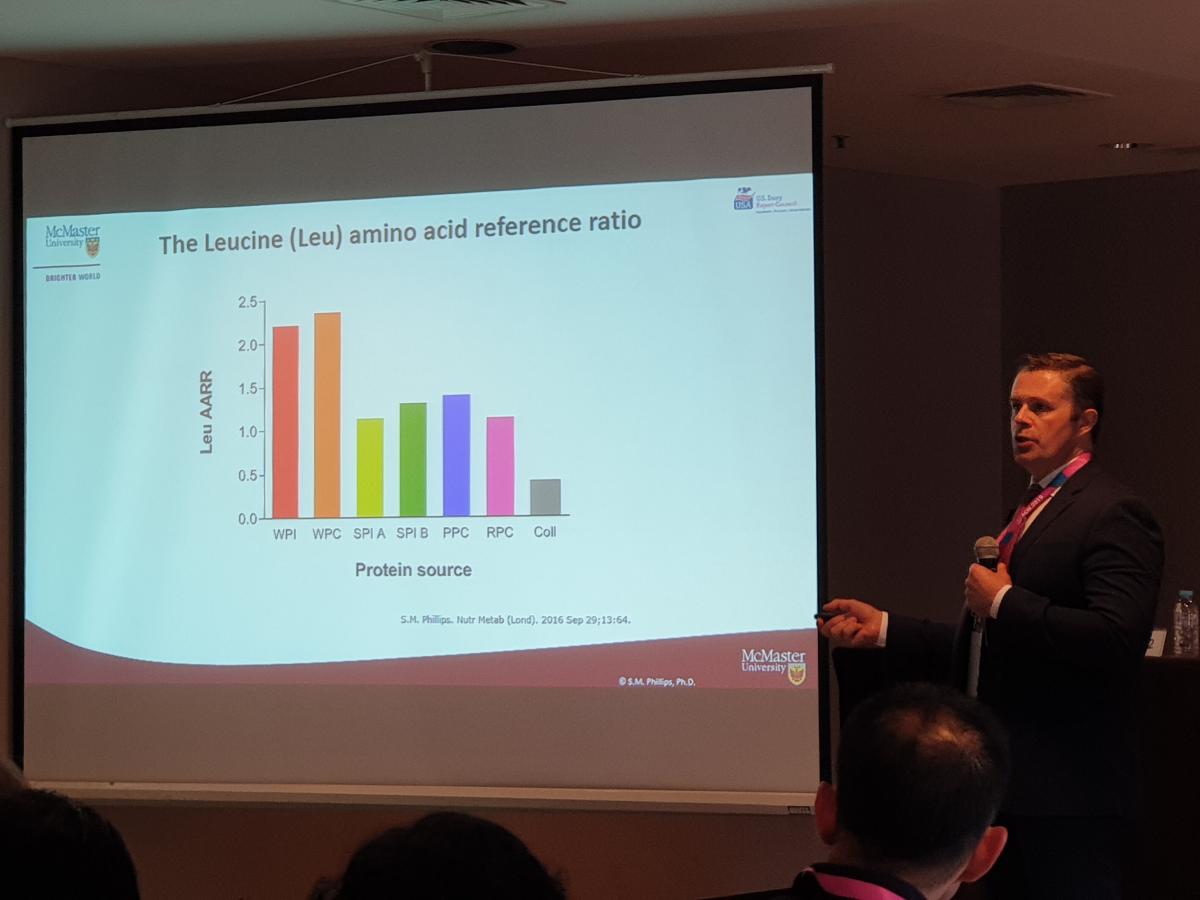As the popularity of consuming higher-protein diets for health and wellness continues to rise, how much and which kind of proteins are ideal are often-asked questions. At an August 5 symposium held as part of the 13th Asian Congress of Nutrition (ACN) 2019 held in Bali, Indonesia, nutrition researchers from North America and Asia shared scientific findings on the role of dairy proteins in supporting healthy aging and weight management goals to optimize sustained well-being across genders and life stages. Chaired by Dr. Khor Geok Lin, Emeritus Professor, Universiti Putra Malaysia, the symposium also shed light on a growing body of evidence suggesting that current dietary protein recommendations are underestimated for certain vulnerable population groups such as seniors and undernourished children, as well as for athletes and people trying to manage their weight.
Dr. Stuart Phillips, Professor, Kinesiology, McMaster University, Canada introduced multifaceted research findings corroborating that protein requirements in older persons appear to be elevated by at least 50% over current recommendations, citing both experimental trials and observational data showing that higher protein intakes are associated with greater muscle mass and better muscle function with aging. He proposed the recommendation that older individuals consume ≥1.2 g of protein per kilogram of body weight daily, up from current World Health Organization (WHO) and other health organizations’ guidelines that adults should consume 0.8g of protein per kilogram of body weight per day. The current guidelines in place were set many decades ago to avoid nutritional deficiencies rather than to optimize specific health outcomes reflective of today’s rapidly aging society, in particular the mitigation of losses of muscle mass with age (sarcopenia).
“Many older adults do not consume protein at the levels required to meet the estimates of greater protein needs to reduce the risk of sarcopenia, the age-related decline in skeletal muscle mass, strength and function,” said Dr. Phillips. “Protein intake requirements for older adults should be reexamined in terms of both the quantity of protein consumed and the protein’s nutritional quality, including an emphasis on the intake of the amino acid leucine which plays a central role in stimulating muscle protein synthesis,” added Dr. Phillips.

Citing several research findings, Dr. Stuart Phillips, Professor, Kinesiology, McMaster University in Canada says older adults need to meet the required levels of protein in order to reduce the risk of sarcopenia.
Protein quality matters—dairy proteins rate high
While there are various different sources of protein, both animal and plant-based, there is wide variance in terms of nutritional quality. The ACN symposium further introduced how whey proteins stand out as a high-quality, complete source of essential amino acids and the leading source of leucine. While other foods may also contain leucine, the amount of food product consumed and corresponding caloric intake would be higher, making whey proteins a convenient and efficient choice for health.
Dr. Jung Eun Kim, Assistant Professor, Food Science & Technology Programme, National University of Singapore further presented findings on the benefits of whey protein for middle-aged and older adults from a body weight and composition perspective, complementing exercise for healthier aging and lifestyles. “Middleaged overweight and obese adults who paired exercise training with a higher protein diet (>1 g protein/kg/day) supplemented with whey protein maintained body weight while reducing fat mass and increasing lean body mass, said Dr. Kim. “Additionally, when mobility-limited older adults participated in resistance training and supplemented their diets with whey protein, they experienced greater increases in lean mass, muscle strength and mid-thigh cross sectional area.”
She also addressed a common misconception, emphasizing that women can consume whey protein without worrying about gaining bulky muscle. “Findings from a recent systematic review and meta-analysis suggest that whey protein supplementation improves body composition by modestly increasing lean mass and this improvement is more robust during weight loss in women,” she added, referring to a body toning effect rather than increased bulkiness.
U.S. Dairy – committed to nutrition and innovation
As consumer health consciousness continues to climb across Southeast Asia, the U.S. dairy industry continues its long-term commitment to not only share the science-backed nutritional advantages of U.S. Dairy but to also expand the enjoyment of nutritious, delicious and sustainably-produced U.S. dairy proteins and ingredients in locallyfriendly food and beverages such as snacks, ready-to-drink beverages and everyday meals and more.
“USDEC is honored to contribute to the exchange of scientific dialogue with nutrition researchers, academia and health professionals here at ACN to advance the understanding of healthy eating guidance surrounding U.S. dairy proteins benefiting the nutritional needs of diverse Asian consumers,” said Kristi Saitama, Vice President, Global Ingredients Marketing, U.S. Dairy Export Council. We have had a fruitful ACN participation as a sponsor, an exhibitor, and supporter of the Young Scientists Award, and look forward to deepening our engagement with both the health and nutrition as well as food and beverage communities across Asia in alignment with this year’s ACN conference theme of ‘Nutrition and Food Innovation for Sustained Well-Being’,” Saitama continued.
Zoom Kobe XII ZK12













